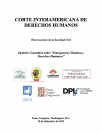
DPLF promotes the use of legal and institutional mechanisms at the national and international level to resolve conflicts related to the extraction of natural resources, in accordance with international human rights norms and standards.
Right to consultation
In the last decade, the number and intensity of social conflicts has increased considerably, threatening democratic government and the stability of various American countries. Although the causes of these conflicts vary, a significant portion of them – and probably the most notorious – are associated with the extraction of natural resources and the construction of infrastructure projects. The right to prior consultation about these projects is fundamental to democracy and peaceful coexistence in Latin America. More
State Responsibility
The extraction of natural resources is an important source of income in Latin America. States play an important role: they have the ability to promote and facilitate private investment in this field and to regulate it in accordance with existing national and international regulatory frameworks. it is essential that both host states (where the activities take place) and those from which the companies originate (home states) attempt to reduce the negative impact of extraction activities, and that they assume their responsibility for the impact of these activities where this exists. More
Corporate Responsibility
The extraction of natural resources has increased considerably in Latin America in recent years, as has the social conflicts associated with these activities. States have the power to promote and facilitate national and international private investment in the area of natural resource extraction, and corporations –both national and transnational– have the right to pursue such investments within the framework of respect for domestic and international law. However, this right goes hand in hand with obligations, and this is where the framework of international law remains weak. More








